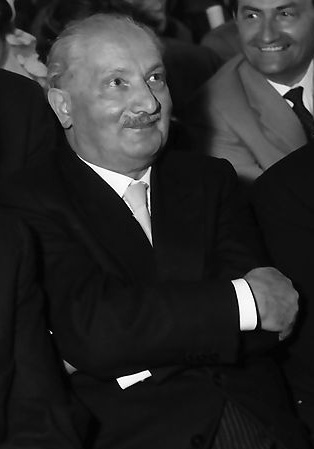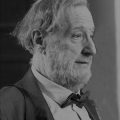A CONSPIRATORIAL PHILOSOPHER
3 April 2023
Although much is being written these days about conspiracy theories, the topic of conspiracy theorizing in philosophy is not discussed in the literature. Political epistemologists cherish easier topics, like the causes of the deaths of famous people, and conspiracy theories about science, pandemics and the like. But Heidegger offers a dramatically different topic, worthy of discussion. Although his ideas from his Black Notebooks are clearly made in the spirit of conspiracy theorizing, as their editor, Peter Trawny, stressed in his (2015) book Heidegger and the myth of a Jewish world conspiracy, they are not much mentioned in the recent literature on conspiracy theories. Here, we want to point out to the phenomenon and open it for a debate.
Heidegger’s views about the deep philosophical, ontological status of the alleged Jewish conspiracy raise questions about what made such an extravagant adventure in philosophical conspiracy theorizing possible, i.e. what features of philosophical traditions could have helped or even nurtured it. We shall assume here that the basic facts of the case are known to the readers; so, we shall only just remind them of the case, and then briefly address the further question of what made it possible. So, let us remind ourselves of Heidegger’s phantasy of Jewish world conspiracy, and of some factors that have enabled the deeply philosophical explanation which he offered for its existence.
Let us follow a simple, and elegant characterization of conspiracy theories offered by Daniel Cohnitz, according to which “a conspiracy theory is an explanation that cites agents acting together in secrecy as a salient cause. (Croatian Journal of Philosophy, Vol. XVIII, No. 53, 2018. “On the Rationality of Conspiracy Theories”, p. 16).
In his Black notebooks Heidegger sets out a series of reflections from the start of the Second World War to 1941, claiming that Weltjudentum (“world Judaism”) is one of the main drivers of western modernity, which he viewed as a negative phenomenon. Here is what he says about Jews: “What these pursue with such planning is a complete deracination of the peoples by harnessing them in a uniformly fabricated and sleek arrangement of all beings. Deracination goes together with the self-alienation of the peoples” (I am quoting this from Trawny’s selection of the main claims of the Notebooks, in his (2015) book, p.19). The feature of the Jewish mind enabling this catastrophic process is “empty rationality and calculative ability”.
Up to this point, Heidegger’s reflections sound like a traditional conspiracy theory. However, there is a philosophical twist. For him, human history is the history of Being itself. “The question concerning the role of world Judaism is not a racial one, but rather the metaphysical question concerning the kind of humanity which, utterly unattached, can take over the uprooting of all beings from being as its world-historical task.”(Ibid.) The term is “being-historical”, having to do with history of Being itself. Trawny rightly talks about Being-historical anti-Semitism in Heidegger. The very Being of the world, our philosopher claims, suffers a tragic fate, stemming from the calculative and manipulative nature of the Jewish mind!
This is the deepest point, I think, that conspiracy theorizing in philosophy has ever reached, and it has been completely ignored in the general literature on conspiracy theorizing.
How is this phenomenon possible at all? How can a great thinker develop ideas about the ‘being-historical’ relevance of alleged Jewish conspiracy or conspiracies? Here is an attempt to point out to a possible answer.
The main tenet of a certain continental tradition within which Heidegger is working is that the historical, anthropological and linguistic are (deeply) ontological. The history of thought and language is the history of Being itself. This position originates with German idealism, with Hegel, but has permeated other sub-traditions. Early Marx famously claimed (in the first Thesis on Feuerbach) that reality should be conceived as “sensuous human activity, practice”. The same claims reappear in more anthropological, and less historical form, in phenomenology and in the early philosophy of existence.
Here a second trait of the tradition makes its appearance, the thesis that the central element of mind and thinking is a-rational; it is either the will, desire or affect. Combined with the first trait it yields spectacular results. In brief, the human and historical are directly ontological, so the fundamental traits of human reality project upon Being itself. Therefore, the fierce passions ruling our heart rule the very Being itself, or are just identical to it. The idea extends to the cosmos itself! This is possible thanks to a dose of anti-realism: if the human mind creates reality, and the mind is a-rational (guided by drives) or even irrational (the drives act contrary to reason), then a-rational or irrational forces create reality. The basic reality of the world is akin to the a-rational element of human mind. In Heidegger’s case, the thesis is that the manipulative character of the Jewish mind creates the corresponding history of being itself, the ‘Being-historical’ process, as he calls it.
- October 2025
- September 2025
- August 2025
- July 2025
- June 2025
- May 2025
- April 2025
- March 2025
- February 2025
- January 2025
- December 2024
- November 2024
- October 2024
- September 2024
- August 2024
- July 2024
- June 2024
- May 2024
- April 2024
- March 2024
- February 2024
- January 2024
- December 2023
- November 2023
- October 2023
- September 2023
- August 2023
- July 2023
- June 2023
- May 2023
- April 2023
- March 2023
- February 2023
- January 2023
- December 2022
- November 2022
- October 2022
- September 2022
- August 2022
- July 2022
- June 2022
- May 2022
- April 2022
- March 2022
- February 2022
- January 2022
- December 2021
- November 2021
- October 2021
- September 2021
- August 2021
- July 2021
- June 2021
- May 2021
- April 2021
- March 2021
- February 2021
- January 2021
- December 2020
- November 2020
- October 2020
- September 2020
- August 2020
- July 2020
- June 2020
- May 2020
- April 2020
- March 2020
- February 2020
- January 2020
- December 2019
- November 2019
- October 2019
- September 2019
- August 2019
- July 2019
- June 2019
- May 2019
- April 2019
- March 2019
- February 2019
- January 2019
- December 2018
- November 2018
- October 2018
- September 2018
- August 2018
- July 2018
- June 2018
- May 2018
- April 2018
- March 2018
- February 2018
- January 2018
- December 2017
- November 2017
- October 2017
- September 2017
- August 2017
- July 2017
- June 2017
- May 2017

